SWEDISH SOUTH ASIAN STUDIES NETWORK
Division of Applied Nutrition and Food Chemistry, Department of Food Technology, Engineering and Nutrition, Faculty of Engineering, Lund University:
Postal address: Industriell näringslära och livsmedelskemi, LTH, Box 124, SE-221 00 Lund,
Sweden
Visiting address: Getingevägen 60, Entrance E
Web site: http://www.appliednutrition.lth.se/english
SASNET Fermented Foods web page: http://www.fermented-foods.net/
Contact person: Professor Emeritus Baboo M Nair, phone: +46 (0)46 222 9634
Applied Nutrition and Food Chemistry
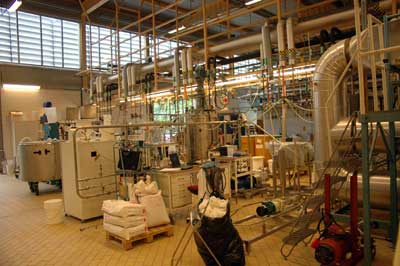 Within the field of applied nutrition, food-related nutritional
research is carried out with the aim of gaining an understanding of how
the composition and properties of food affect the health of the consumer.
Special interest is being focused on the possibility of optimising the
nutritional content and health-promoting properties in general through
the selection of raw materials and processes in the production of foodstuffs.
Within the field of applied nutrition, food-related nutritional
research is carried out with the aim of gaining an understanding of how
the composition and properties of food affect the health of the consumer.
Special interest is being focused on the possibility of optimising the
nutritional content and health-promoting properties in general through
the selection of raw materials and processes in the production of foodstuffs.
Within the subject of food chemistry, reactions are being studied in the
handling, storage and processing of foodstuffs. Great importance is afforded
to the development of new and specific methods for food analysis. One
of our most important projects is concerned with the changes in dietary
fibre during processing. Another central area is the study of the Maillard
reaction in relation to safe food, i e the production of carcinogenic
substances during the heating of food, and their effects.
Research at the Department is being carried out by 5 groups:
‡ Bioavailability and the Nutritional Importance of Carbohydrates
Head of Research: Professor Inger Björk‡ Nutrition in the Developing Countries
Head of Research: Professor Baboo M. Nair‡ The Composition and Nutritional Importance of Indigestible Carbohydrates
Head of Research: Professor Margareta Nyman‡ The Formation and Role of Genotoxic (Mutagenic) Substances, Food Product Analysis
Head of Research: Dr Kerstin Skog‡ Applied Food Chemistry
Head of Research: Rickard Öste, Adjuncted Professor
Ongoing Research Projects related to South Asia
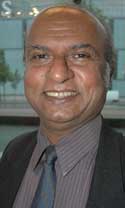 • Professor Emeritus Baboo
M Nair is involved in a number of research projects
connected to India, and has been instrumental in creating a South
Asian network for research on fermentation of foods. His research
field is fermentation
as a method of food preservation. It is widely practised
as an easy and convenient way of food preservation in almost all
parts of the world. It is also energy efficient, environment friendly
and sustainable process. In addition it has also many other advantages
like improvement of sensory properties like taste and smell as well
as physical characteristics like viscosity and water holding capacity.
Food safety is improved by prevention of the growth of pathogenic
micro-organisms while the nutritional properties are improved by
starch degradation, protein digestibility, production of vitamins,
and degradation of some anti-nutrients like phytic acid.
• Professor Emeritus Baboo
M Nair is involved in a number of research projects
connected to India, and has been instrumental in creating a South
Asian network for research on fermentation of foods. His research
field is fermentation
as a method of food preservation. It is widely practised
as an easy and convenient way of food preservation in almost all
parts of the world. It is also energy efficient, environment friendly
and sustainable process. In addition it has also many other advantages
like improvement of sensory properties like taste and smell as well
as physical characteristics like viscosity and water holding capacity.
Food safety is improved by prevention of the growth of pathogenic
micro-organisms while the nutritional properties are improved by
starch degradation, protein digestibility, production of vitamins,
and degradation of some anti-nutrients like phytic acid.
In a first phase of this research project Prof. Nair and his colleagues
studied the factors which affect the rate of pH reduction and the
amount of various organic acids produced at different intervals during
fermentation (spontaneous as well as back slopping technique) of a
wheat flour slurry in water using an HPLC method.
The effect of fermentation on the growth of a pathogenic Escherichia
coli- strain NG7C in gruels made from whole grain flours of wheat
and tef after spontaneous fermentation as well as back-slopping were
also studied.
 Prof. Nair has a close collaboration with Kerala University in India. Its Pro Vice Chancellor has visited Lund University in connection with the Erasmus Mundus Action 2 programme that LU and Kerala University are both members of (more information). Together they are now trying to develop an international Masters programme in Biotechnology and Bioinformatics at Kerala University. Future plans are also to develop collaborative self financing international masters degree programmes in food science and biotechnology also at Anand Agricultural University in Gujarat (another collaboration partner). The programmes should be carried out in collaboration with the Faculty of Engineering (LTH) at Lund University.
Prof. Nair has a close collaboration with Kerala University in India. Its Pro Vice Chancellor has visited Lund University in connection with the Erasmus Mundus Action 2 programme that LU and Kerala University are both members of (more information). Together they are now trying to develop an international Masters programme in Biotechnology and Bioinformatics at Kerala University. Future plans are also to develop collaborative self financing international masters degree programmes in food science and biotechnology also at Anand Agricultural University in Gujarat (another collaboration partner). The programmes should be carried out in collaboration with the Faculty of Engineering (LTH) at Lund University.
Recently, in 2009, a new network was formed, Sustainable Kerala Network, with active support from SASNET and Lund University. It has been registered as a nongovernmental organisation in India, and a partner for collaboration with Lund University, LTH and INSTEC on environmental issues. More information on the formation of the Sustainable Kerala network. ![]()
SASNET Fermented Foods Network
On an International level Prof. Baboo
Nair has been instrumental
in forming a network of scientists who are doing research on fermentation
of foods in South Asia, the SASNET – Fermented Foods project, with initial funding from SASNET.
The work has been carried out in collaboration with
Professor J B
Prajapati,
Head of the Dairy Microbiology Department, SMC
College of Dairy Science, Anand
Agricultural University,
Gujarat, India.
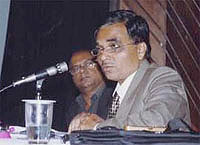 Nair
and Prajapati (both seen on the photo to the right) received
three
SASNET planning grants, one in January
2002,
the second in August 2002, and the
third in August 2004, for a project
titled ”Development of an interdisciplinary
Swedish South Asian Studies Network for research on fermentation of
foods in relation to public health and social welfare”.
Nair
and Prajapati (both seen on the photo to the right) received
three
SASNET planning grants, one in January
2002,
the second in August 2002, and the
third in August 2004, for a project
titled ”Development of an interdisciplinary
Swedish South Asian Studies Network for research on fermentation of
foods in relation to public health and social welfare”.
The seed money was used first to organise an International seminar and
workshop in Anand, Gujarat, India, 13–14
November 2003, and then to establish an International network. The
workshop in 2003, titled ”Fermented Foods,
Health Status and Social Well being”, was
jointly organised by the Dept of Applied Nutrition, Lund University,
and the Dept of Dairy Microbiology, Gujarat Agricultural
University.
The meeting was attended by about 165 participants, most
of them from India, but also from Sweden, Denmark, Australia, USA,
Nepal, Sri Lanka and Bangladesh. Dr V Kurien, the father of White Revolution
in India, inaugurated the seminar on 13 November. In the final Joint
Session, the participants resolved unanimously to establish a Network
on Fermented foods. Read
a comprehensive conference report (as a pdf-file).
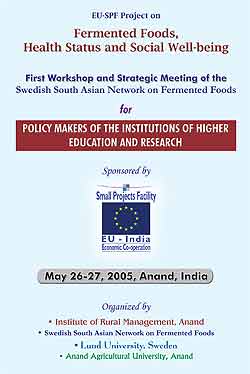 In
November 2004 the Delegation
of the European Commission to India, Bhutan, Maldives, Nepal and Sri
Lanka decided to grant a sum of 63 280 Euros for the
networking activities of the recently formed SASNET–Fermented
Foods project, jointly run by the Dept. of Applied
Nutrition and Food Chemistry, (through Baboo Nair), SMC College of
Dairy Science, Anand, India (through Dr. J.B. Prajapati), and the
Institute of Rural management, also in Anand (through Dr. Pratap
Reddy).
In
November 2004 the Delegation
of the European Commission to India, Bhutan, Maldives, Nepal and Sri
Lanka decided to grant a sum of 63 280 Euros for the
networking activities of the recently formed SASNET–Fermented
Foods project, jointly run by the Dept. of Applied
Nutrition and Food Chemistry, (through Baboo Nair), SMC College of
Dairy Science, Anand, India (through Dr. J.B. Prajapati), and the
Institute of Rural management, also in Anand (through Dr. Pratap
Reddy).
The grant was used for organising a series of three strategic meetings/workshops
during the year 2005. The first seminar for informing R&D directors
of food research institutions, and the second addressed towards food
industries and the third one for important media people, including
social workers, politicians and journalists. More
information on the SASNET–Fermented Foods project’s home
page.
In August 2005 Prof. Nair again received a SASNET
planning grant in connection with the SASNET – Fermented
Foods network, this time for a project titled ”Creation
of data base and interactive website for SASNET-fermented foods (Swedish
South Asian network for fermented foods), plus organising a second
International seminar on fermented foods.”
The web site was created, see http://www.fermented-foods.net/,
and in December 2005 the Second International Conference
on ”Fermented Foods, Health Status and Social Well-being” was
held in Anand, Gujarat. The conference was now organized by the Swedish
South Asian Network on Fermented Foods, in association with Anand Agricultural
University, Institute of Rural Management, Anand, and the Dept. of Applied
Nutrition, Lund University. More information
on the conference (as a pdf-file).
As a part of the European Commission funded project
Prof. Nair and his partners also invited a group of Indian scientists
to Sweden to conduct a final strategic meeting of the Sasnet Fermented
Foods project. This coincided with
the International Food & Health Innovation Conference 2006,
held in Malmö and
Lund, 25–27 October 2006, a conference organised by the Skåne
Food Innovation Network (Skånes Livsmedelsakademi) and dealing
with obesity, diabetes and other diet-related disorders.
 A
separate one-day seminar about the potential of fermented foods of South
Asia was held in Copenhagen on Monday 23 October 2006.
The seminar was titled “Fermented foods, health status, and
wellbeing”, jointly organised by Sasnet Fermented
Foods and the Øresund Food Network. During the
seminar, scientists from India, coming from prominent institutions of
food and dairy research in the country, presented examples of modern
food research on fermented foods being conducted in India. Special attention
was paid to health promoting foods. More
information.
A
separate one-day seminar about the potential of fermented foods of South
Asia was held in Copenhagen on Monday 23 October 2006.
The seminar was titled “Fermented foods, health status, and
wellbeing”, jointly organised by Sasnet Fermented
Foods and the Øresund Food Network. During the
seminar, scientists from India, coming from prominent institutions of
food and dairy research in the country, presented examples of modern
food research on fermented foods being conducted in India. Special attention
was paid to health promoting foods. More
information.
Read a report about the South Asia research
presented at the conferences in Copenhagen and Malmö, written
by Nenda
Wangchuk (photo to the right ), Masters student from
Bhutan, presently studying at the Dept. of Applied Nutrition and
Food Chemistry.
• The Third International Conference on Fermented Foods was held in Anand, Gujarat, India, 14–15 December 2007. It was organised by the Dept. of Dairy Microbiology at Anand Agricultural University; in collaboration with the Dept. of Applied Nutrition and Food Chemistry, Lund University, Sweden, UNESCO Institute of Trace Elements in Lyon, France; and the National Dairy Development Board in Anand, on behalf of the Swedish South Asian Network on Fermented Foods (SASNET–Fermented Foods), that was established with SASNET support in 2002. More information (as a pdf-file)
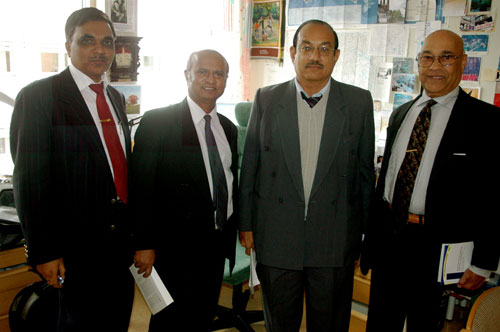 |
| Dr. J.B. Prajapati, Anand Agricultural University, Prof. Baboo Nair, Lund University, Dr. A.K. Pathak, Anand Agricultural University, and Dr. M. Abdulla, UNESCO Institute of Trace Elements, Lyon, France, during their visit to the SASNET office in Lund. |
• A delegation from Anand Agricultural University (AAU), consisting of Dr. A.K. Pathak, Director of Research at AAU, and Dr. J.B. Prajapati (who is the Coordinator of the SASNET Fermented Foods project) visited Sweden in the beginning of October 2007. The Vice Chancellor, Prof. Dr. Varshneya, was also supposed to come, but had to cancel his tour at the last minute. The delegation mainly visited Lund University, where an extensive programme had been prepared for them to visit several departments, but also including an important meeting with representatives for the Rector’s office, Lund Institute of Technology. This meeting was aimed at facilitating a long-term collaboration between the Food departments of LTH/LU and related faculties of Anand Agricultural University.
The collaboration
if it develops well would/could be, included in the present Indian
national effort in establishing four centres of excellence in food
processing at different parts of the country, AAU being one of them.
The Ambassador of India to Sweden, Ms. Deepa Gopalan Wadhwa, and the First Secretary, Mr. Rajesh Vaishnaw, came to Lund to participate in this meeting, and since SASNET was instrumental in the creation of the SASNET Fermented Foods Network, giving initial funding, the delegation also made a courtesy call to the SASNET office on Tuesday 2 October 2007. The guest from India weere also accompanied by Dr. M. Abdulla, UNESCO Institute of Trace Elements, Lyon, France, who is also involved in the collaboration on fermented foods with AAU in India. An informal meeting was organised by SASNET (Anna Lindberg and Lars Eklund) in the conference room at the Centre for East and South-East Asian Studies (ACE), Scheelevägen 15 D.
The visit to Lund included not only meetings with researchers at LTH,
but also with representatives for Ideon Research Park, Lund Innovation
and LUAB, and from Lund they also went to Stockholm, for
meetings at the Royal Institute of Technology, KTH
• The Fourth International Conference on Fermented Foods, Health Status and Social Well-being was held at Anand Agricultural University in Gujarat, India, on 11–12 December 2009. The conference was organised by the Swedish South Asian Network on Fermented Foods (SASNET – Fermented Foods), in association with Anand Agricultural University, the National Dairy Development Board in Anand, and Lund University, Sweden. Full information about the 2009 conference.
• The fifth International Conference on
Fermented Foods, Health Status
and Social Well-being will be held at the Central Food Technological Research Institute (CFTRI) in Mysore, India on 15th and 16th of December 2011. SASNET Fermented Foodsis a forum for scientists of the south Asian countries, Sweden and other countries for exchanging information in the field of food fermentation and its practical application. For more details around the 2011 workshop, please contact the organising secretary, Dr. G. Vijayalekshmi, Deputy Director, Food Microbiology Department, CFTRI. More information about SASNET Fermented Foods. ![]()
Research projects related to South Asia
• Professor Nair
is also involved in a research project called ”Evaluation
of Salvinia Auriculata as a raw material for agro-food-feed industry”.
This is carried out in collaboration with the Krishi
Vigyan Bhavan, Vellanad,
India and the Kerala Agricultural University in
Vellyani, India, and has received funding from Sida/SAREC.
Abstract:
Salvinia auriculata is an aquatic plant which grows quickly and well
in competition with other plants, all over the backwaters, irrigation
channels, water reservoirs and irrigated rice fields of Kerala State
in India. Eradication of this weed by various means has not been very
successful. The main objectives of the present project is to carry out
chemical analysis of the vegetative parts of the plant to determine
its economic value and suitable utilisation in food, feed and/or other
agriculture based industries.
In February 2005 Prof. Nair received a SASNET planning grant related to this project, in order to organise a workshop on sustainable utilisation of tropical plant biomass as a raw material in an integrated agro-food process industry. The idea is to organise a workshop in Thiruvananthapuram inviting researchers from India and other South Asian countries, such as Sri Lanka and Maldives. The planning is made by Prof. Nair in collaboration with Dr. V. Shobha, Head of the Dept. of Environmental Sciences, Kerala University, Thiruvananthapuram; Dr. G.M. Nair, Director of the Tropical Botanical Garden and Research Institute, Thiruvananthapuram; and Dr. Madhusoodanan, Head of the Dept. of Botany, Calicut University.
An international seminar and workshop on ”Sustainable Utilization of Tropical Plant Bio-mass” was held in Thiruvananthapuram, Kerala State, India, 15–16 December 2008. It was jointly organized by the Centre for Bioinformatics, and the Department of Environmental Sciences of Kerala University; Kerala Agricultural University; Kerala State Council of Science Technology and Environment; the SASNET Fermented Foods (based at Anand Agricultural University, Gujarat); and the Dept. of Applied Nutrition, Lund University. Full information.
A second conference on the same theme was held at Kerala University, Karyavattom Campus 14–15 December 2010. It was organised by the same partners as the 2008 conference.
The aim was to present a platform for discussing sustainable utilization of the tropical plant biomass addressing not only to the day to day needs of the human beings regarding food, shelter, health and social well-being but also covering aspects of biodiversity, environmental hazards and climatic changes in a long term perspective.
Delegates were expected from India, Sri Lanka, Sweden and many other countries. The scientific committee has included Dr. Rickard Öste, Lund University; Dr. Sagarika Ekanayake, Jayawardenapura University, Sri Lanka; Dr. Sasikumar Punnekkat, School of Innovation, Design and Engineering, Mälardalen University (MDH), Campus Västerås; and Dr. Rajiv Thottapallil, Division for Electricity and Lightning Research, Uppsala University. More information.![]()
Read also an article on the conference in The Hindu, 18 October 2010.
• Professor Nair is finally involved in a research project titled
”Composition
and nutritional value of Canavalia Gladiata”. This
project is carried out in collaboration with Dr. Sagarika
Ekanayake,
Department of Medical nutrition, Faculty of medical Sciences, Sri
Jayawardenepura University, Sri Lanka.
Project abstract: Legumes like Canavalia gladiata (Sword beans, a common vegetable in
Sri Lanka) are important sources of protein in developing countries.
Composition and physicochemical properties of the protein and starch
in this legume are being studied for development of products of optimal
quality for human consumption. Most of the leguminous seeds contain
protein of high nutritional value, which can be complementary to cereal-based
diets. Canavalia Gladiata is grown in Sri Lanka for its tender fruits/beans,
which are usually consumed as a green vegetable. The dried seeds of
Canavalia Gladiata could be used for production of flour for use as
a food ingredient. The nutritional quality of the seeds are evaluated
by chemical analysis as well as animal feeding experiments. Protein
nutritional quality, anti-nutritional constituents like amylase inhibitors,
phytic acid and protease inhibitors as well as nature and quality of
starch and protein were also determined.
Dr. Ekanayake was a sandwich PhD student at Lund University, and defended her doctoral dissertation, called ”Potential of Canavalia gladiata as a food ingredient – nutritional and functional aspects”, on Wednesday 1 June 2005. Three years earlier Ekanayake defended her Licentiate thesis at Lund University on the same subject. The thesis deals with the tender fruits of sword beans (Canavalia gladiata), eaten as a green vegetable in Sri Lanka, and how methods could be developed to increase the utilization of sword beans for human consumption. Faculty opponent was Professor Ulf Svanberg, Division of Food Science, Chalmers University of Technology, Göteborg. More information with abstract.
Erasmus Mundus External Cooperation Window Programme scholarship holders
A large number of Indian students, PhD candidates, post-docs and academic staff has come to Lund University during the academic year 2009-10, and anothre batch during the academic year 2010-11, as scholarship holders through the Erasmus Mundus External Cooperation Window mobility programme Lot 15, coordinated by Lund University. This programme was announced in 2008, and out of a total mobility of 320 persons, 53 Indian students, researchers and academic staff were selected to come specically to Lund University. More information about the EMECW programme lot 15 (from 2009 renamed to be one out of four programmes under the mobility lot 13). ![]()
In 2009, Prof. Baboo Nair was selected by the consortium behind the mobility lot to go to India for two months as a scholarship holder being an academic staff at Kerala University. In 2010, he was again selected a scholarship holder, this time to spend three months at Anand Agricultural University in Gujarat. ![]()
In the other direction, Prof. Jashbhai B. Prajapati, involved in research collaboration with the Dept. of Applied Nutrition and Food Chemistry (see above), was selected to spend two months at the Dept. of Biotechnology, Lund University, also as an academic staff. While in Lund, he organises a mini course on Fermented Foods, and is also planning collaborative research projects. Prof. Prajapati is also coordinating activities of SASNET-Fermented Foods, the network of scientists, academicians, professionals, industry personnel and others interested in promoting fermented foods for public health and social well-being.
Another scholarship holder from India to get a temporary position as a post-doc at the Dept. of Applied Nutrition and Food Chemistry in 2009 was Dr. Maya Raman, with a doctorate from the School of Industrial Fisheries, Cochin University of Science and Technology, Kerala, India. Dr. Raman is engaged in a research study on Dietary fibers and Food Mutagens.
Her research work has focused on the role of collagen on texture of muscle tissue during freezing and cooking. She has selected three species viz., a fresh water fish (rohu), marine water cephalopod (squid) and an elasmobranch (shark). They differ in their collagen content; and squid and shark were found to contain highest concentration. The theory has been supported by Texture Profile Analyzer, Histochemistry and Electrophoresis. Dr. Raman has published a few papers in refereed national and international journals and symposia.
PhD candidate Bindu Sunilkumar came in August 2010 as a scholarship holder to spend three years at the department. She will be supervised by Prof. Rickard Öste. Her research work will focus on isolating and identifying Oat proteins and to create a best oat variety with high quality protein. ![]()
SASNET - Swedish South Asian Studies Network/Lund
University
Address: Scheelevägen 15 D, SE-223 70 Lund, Sweden
Phone: +46 46 222 73 40
Webmaster: Lars Eklund
Last updated
2011-08-09
